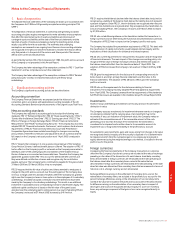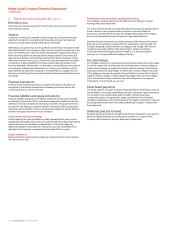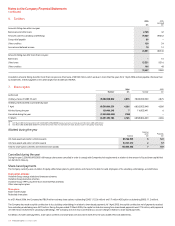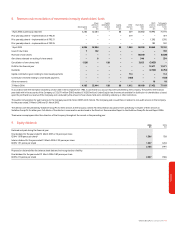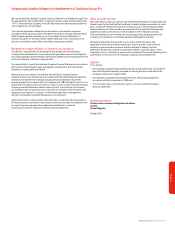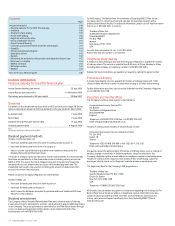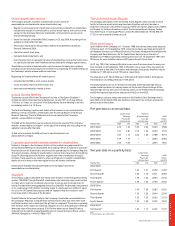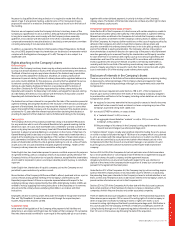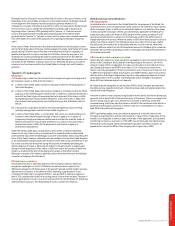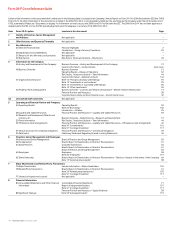Vodafone 2006 Annual Report Download - page 145
Download and view the complete annual report
Please find page 145 of the 2006 Vodafone annual report below. You can navigate through the pages in the report by either clicking on the pages listed below, or by using the keyword search tool below to find specific information within the annual report.
Vodafone Group Plc Annual Report 2006 143
No person is disqualified from being a director or is required to vacate that office by
reason of age. If, at a general meeting, a director who is 70 or more years of age is
proposed for election or re-election, that director’s age must be set out in the notice of
the meeting.
Directors are not required, under the Company’s Articles, to hold any shares of the
Company as a qualification to act as a director, although executive directors participating
in long term incentive plans must comply with the Company’s share ownership
guidelines. In accordance with best practice in the UK for corporate governance,
compensation awarded to executive directors is decided by a remuneration committee
consisting exclusively of non-executive directors.
In addition, as required by The Directors’ Remuneration Report Regulations, the Board
has, since 2003, prepared a report to shareholders on the directors’ remuneration which
complies with the Regulations (see pages 61 to 69). The report is also subject to a
shareholder vote.
Rights attaching to the Company’s shares
Dividend rights
Holders of the Company’s ordinary shares may by ordinary resolution declare dividends
but may not declare dividends in excess of the amount recommended by the directors.
The Board of directors may also pay interim dividends. No dividend may be paid other
than out of profits available for distribution. Dividends on ordinary shares will be
announced in pounds sterling. Holders of ordinary shares with a registered address in a
euro-zone country (defined, for this purpose, as a country that has adopted the euro as
its national currency) will receive their dividends in euro, exchanged from pounds
sterling at a rate fixed by the Board of directors in accordance with the Articles of
Association. Dividends for ADS holders represented by ordinary shares held by the
Depositary will be paid to the Depositary in US dollars, exchanged from pounds sterling
at a rate fixed by the directors in accordance with the Articles of Association, and the
Depositary will distribute them to the ADS holders.
If a dividend has not been claimed for one year after the later of the resolution passed at
a general meeting declaring that dividend or the resolution of the directors providing for
payment of that dividend, the directors may invest the dividend or use it in some other
way for the benefit of the Company until the dividend is claimed. If the dividend remains
unclaimed for 12 years after the relevant resolution either declaring that dividend or
providing for payment of that dividend, it will be forfeited and belong to the Company.
Voting rights
The Company’s Articles of Association provide that voting on Substantive Resolutions
(i.e. any resolution which is not a Procedural Resolution) at a general meeting shall be
decided on a poll. On a poll, each shareholder who is entitled to vote and is present in
person or by proxy has one vote for every share held. Procedural Resolutions (such as a
resolution to adjourn a General Meeting or a resolution on the choice of Chairman of a
General Meeting) shall be decided on a show of hands, where each shareholder who is
present at the meeting has one vote regardless of the number of shares held, unless a
poll is demanded. In addition, the Articles of Association allow persons appointed as
proxies of shareholders entitled to vote at general meetings to vote on a show of hands,
as well as to vote on a poll and attend and speak at general meetings. Holders of the
Company’s ordinary shares do not have cumulative voting rights.
Under English law, two shareholders present in person constitute a quorum for purposes
of a general meeting, unless a company’s articles of association specify otherwise. The
Company’s Articles of Association do not specify otherwise, except that the shareholders
do not need to be present in person, and may instead be present by proxy, to constitute
a quorum.
Under English law, shareholders of a public company such as the Company are not
permitted to pass resolutions by written consent.
Record holders of the Company’s ADSs are entitled to attend, speak and vote on a poll or
a show of hands at any general meeting of the Company’s shareholders by the
Depositary’s appointment of them as corporate representatives with respect to the
underlying ordinary shares represented by their ADSs. Alternatively, holders of ADSs are
entitled to vote by supplying their voting instructions to the Depositary or its nominee,
who will vote the ordinary shares underlying their ADSs in accordance with their
instructions.
Employees are able to vote any shares held under the Vodafone Group Share Incentive
Plan and “My ShareBank” (a vested share account) through the respective plan’s
trustees, Mourant ECS Trustees Limited.
Liquidation rights
In the event of the liquidation of the Company, after payment of all liabilities and
deductions in accordance with English law, the holders of the Company’s 7% cumulative
fixed rate shares would be entitled to a sum equal to the capital paid up on such shares,
together with certain dividend payments, in priority to holders of the Company’s
ordinary shares. The holders of the fixed rate shares do not have any other right to share
in the Company’s surplus assets.
Pre-emptive rights and new issues of shares
Under Section 80 of the Companies Act, directors are, with certain exceptions, unable to
allot relevant securities without the authority of the shareholders in a general meeting.
Relevant securities as defined in the Companies Act include the Company’s ordinary
shares or securities convertible into the Company’s ordinary shares. In addition, Section
89 of the Companies Act imposes further restrictions on the issue of equity securities (as
defined in the Companies Act, which include the Company’s ordinary shares and
securities convertible into ordinary shares) which are, or are to be, paid up wholly in cash
and not first offered to existing shareholders. The Company’s Articles of Association
allow shareholders to authorise directors for a period up to five years to allot (a) relevant
securities generally up to an amount fixed by the shareholders and (b) equity securities
for cash other than in connection with a rights issue up to an amount specified by the
shareholders and free of the restriction in Section 89. In accordance with institutional
investor guidelines, the amount of relevant securities to be fixed by shareholders is
normally restricted to one third of the existing issued ordinary share capital, and the
amount of equity securities to be issued for cash other than in connection with a rights
issue is restricted to 5% of the existing issued ordinary share capital.
Disclosure of interests in the Company’s shares
There are no provisions in the Articles of Association whereby persons acquiring, holding
or disposing of a certain percentage of the Company’s shares are required to make
disclosure of their ownership percentage, although such requirements exist under the
Companies Act.
The basic disclosure requirement under Sections 198 to 211 of the Companies Act
imposes upon a person interested in the shares of the Company a statutory obligation
to provide written notification to the Company, including certain details as set out in the
Companies Act, where:
(a) he acquires (or becomes aware that he has acquired) or ceases to have (or becomes
aware that he has ceased to have) an interest in shares comprising any class of the
Company’s issued and voting share capital; and
(b) as a result, EITHER he obtains, or ceases to have:
(i) a “material interest” in 3%, or more; or
(ii) an aggregate interest (whether “material” or not) in 10%, or more of the
Company’s voting capital; or
(iii) the percentage of his interest in the Company’s voting capital remains above the
relevant level and changes by a whole percentage point.
A “material interest” means, broadly, any beneficial interest (including those of a spouse
or a child or a step-child (under the age of 18), those of a company which is accustomed
to act in accordance with the relevant person’s instructions or in which one third or more
of the votes are controlled by such person and certain other interests set out in the
Companies Act) other than those of an investment manager or an operator of a unit
trust/recognised scheme/collective investment scheme/open-ended investment
company.
Sections 204 to 206 of the Companies Act set out particular rules of disclosure where
two or more parties (each a “concert party”) have entered into an agreement to acquire
interests in shares of a public company, and the agreement imposes
obligations/restrictions on any concert party with respect to the use, retention or
disposal of the shares in the company and an acquisition of shares by a concert party
pursuant to the agreement has taken place.
Under Section 212 of the Companies Act, the Company may by notice in writing require
a person that the Company knows or has reasonable cause to believe is or was during
the preceding three years interested in the Company’s shares to indicate whether or not
that is correct and, if that person does or did hold an interest in the Company’s shares, to
provide certain information as set out in the Companies Act.
Sections 324 to 329 of the Companies Act further deal with the disclosure by persons
(and certain members of their families) of interests in shares or debentures of the
companies of which they are directors and certain associated companies.
There are additional disclosure obligations under Rule 3 of the Substantial Acquisitions
Rules where a person acquires 15% or more of the voting rights of a listed company or
when an acquisition increases his holding of shares or rights over shares so as to
increase his voting rights beyond that level by a whole percentage point. Notification in
this case should be to the Company, the Panel on Takeovers and Mergers and the UK
Listing Authority through one of its approved regulatory information services no later
than 12 noon on the business day following the date of the acquisition.
Shareholder information


